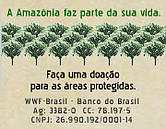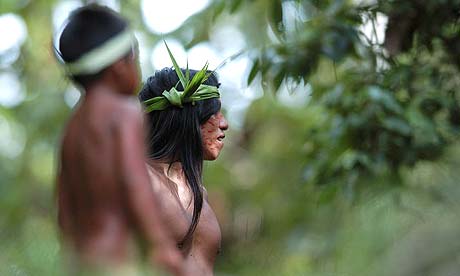Down there was the stuff of boyhood fantasies: giant spiders, venomous snakes, tribes who hunt with blowpipes. If it was hard to believe where I was, it was harder still to believe what I was there to do. I was about to spend a week with the Huaorani, one of the most recently contacted tribes in the Amazon.
The four-seater plane buzzed angrily as we banked and for the first time we saw the landing strip ahead.
"Doesn't look like much of a runway," I muttered, as I stared down at the patch of Ecuadorean jungle that was our destination.
"They cut it with machetes this morning," grinned Jascivan, my guide. "Might be a little bumpy."
The Huaorani first made the headlines in 1950 when they killed five American missionaries with spears. Since then a large number of the tribe have converted to Christianity and maintained regular contact with the outside world. But others have retreated deeper into the forest, where their whereabouts remain unknown.
It was the "settled" Huaorani, of course, that I was here to visit. For aside from missionaries, another western intruder has lately been making undue demands on their way of life. Oil companies, hungry for the estimated one billion barrels of black gold that lie beneath the Yasuni national park, are offering large sums of money for the right to drill their lands. In need of money but anxious to hold on to their ancestral territory, the Huaorani have attempted something remarkable. In a joint venture with Tropic Journeys in Nature, which is based in the Ecuadorean capital, Quito, they have built an ecolodge. I was among the first visitors.
Representatives of the Huaorani community of Quehueri'ono were waiting to greet us after the 40-minute flight from Shell, an unremarkable town in the central highlands. Their leader, Moi Enomenga, cut a striking figure in his white headdress and clutching a 12ft blowpipe. Others wore less traditional clothes, such as Ecuadorean football shirts, and Nike trainers. One woman had a monkey perched on her shoulder.
"Moi is the most well travelled Huaorani ever," explained Jascivan, "and he's become a hero for his village." Moi has been to New York several times, and is the principal character in Joe Kane's book about the Huaorani, Savages.
After half an hour of introductions to what seemed like an entire village, we made our way to the lodge in a quilla (canoe). Considering the remoteness of the location, I was expecting little more than tents, but was pleasantly surprised to find five log cabins with wooden decks. Each one has hot water and a flush toilet, Jascivan told us proudly, and there is a large central dining room.
"It's taken a long time, though," he added. "From our first meetings with Moi until now has taken almost 10 years. So you can see why the Huaorani are so excited to have you here."
That evening, after a traditional meal of mashed plantain, rice, and beans (this trip isn't for those looking for gourmet food), I lay in my bed, listening to the sounds of the jungle - which on one side of the cabin is only kept at bay by a mosquito net. The chirps, squeaks and flutterings were so loud it sounded like the local wildlife had made my room its home for the night.
We were up at 5am the next morning for our first hike, led by a Huaorani guide and a naturalist from Tropic. Grateful for the wellington boots provided by the Huaorani (the Amazon is a magical place, but it's muddy), we tramped through the jungle, pausing every few minutes while our guides explained the uses and properties of various plants. Everything, it seemed, had a purpose.
Dragon's blood, we were told, was a plant that could be used as a coagulant. Another was an effective local anaesthetic. A large cotton-like plant provided wadding for blowpipes, another (curare) a poison for the dart tips. To outsiders the jungle is a vast, alien environment, but for the Huaorani it is comforting and abundant.
"The jungle has always given us everything," said our guide. "Our food, our medicine, our shelter, even our clothes. We have no wish to leave it."
Pointing to his blowpipe, I asked what they hunted. He told me that their prey includes peccary (wild boar) and howler monkey. "When we catch some meat we take only what we need, then leave the rest in a communal area for anyone else to eat. That way nothing is wasted, and there is food for those too old to hunt."
Raising the blowpipe to his lips he shot a dart into a target the size of a 10p coin. "If you aim the dart in the right place," he told us, "the poison enters the animal's blood stream and the animal falls to the ground. Then we finish it with the tapa [spear]. Will you try?"
He handed me the blowpipe, and showed me how to insert the dart. I took aim at a tall tree, and mustered the best puff of air I could. The dart flew out, sailed high up into the trees in a corkscrew motion, and was lost. The Huaorani guide roared with laughter, patted me on the back and said: "It's a good thing you're with us or tonight you would go hungry."
Walking back to the lodge for another (non monkey-based) meal, a beer, and a few hours in my hammock, I couldn't have agreed more. Ahead of me lay four days of safely guided but wild adventure with the Huaorani. It was a quintessentially modern kind of travel experience.
Less adventurous, but equally enjoyable, is another Ecuadorean lodge, Yachana, several hours away down the Napo river. While the Huaorani lodge is in its infancy, Doug McMeekin, a charismatic American, has been perfecting his for more than a decade. It was the oil industry, too, which brought Doug to Ecuador. But after falling in love with the country, and recognising the need for sustainable alternatives to the black gold, he found some land on the edge of the Napo river and set about building a lodge. What he's accomplished is a model ecotourism project, providing environmental, educational, medical, and agricultural benefits for the Amazon's inhabitants.
Arriving at Yachana (which means "place of learning") it is clear that this is not so much a lodge as an entire village. Guests are not cut off from the community, but involved in the indigenous lifestyle.
That said, you are well looked after. Each room has a private bathroom with a shower and purified tap water, as well as a view of the river. The food is also a source of pride. At dinner on the first night, we ate majado - mashed plantain with tomatoes, a fried egg and a spicy peanut sauce - and drank excellent Chilean wine.
"Yes, there's hiking here, and birdwatching, and river excursions, and all that stuff you expect at a jungle lodge," said Douglas. "All that's great fun. And we've bought more than 3,000 acres of rainforest since we've been here, to stop it being logged. But if someone asks me what's the most important thing we're doing here, I'd say it was the school. It educates 140 students, and we're thinking about starting a community college, too. Ecuador's got 30 years of oil left, which supports more than 60% of their economy. We have to give these kids options outside that."
Next morning, fuelled up by some of Yachana's Jungle Chocolate, made from pure local cacao, I changed into swimming trunks, grabbed a giant inner tube, and boarded a boat to be ferried several miles up river. After a week of rain, the water was flowing fast, creating the perfect conditions for diving in and simply floating home.
A few minutes later, the boat was on its way back to the lodge, and I was left to meander gently downstream. Images of piranhas and caimans filled my head, but Juan assured me it was safe. Soon, my mind quietened, and I heard only the rushing of the Amazon. As the sound of the engine died, the sense of space and solitude was extraordinary.
Over the next few days, I visited a shaman, a seventy-year old man who "cleanses negative energies" (for a small fee). He welcomed me into his shack on the lee shore of the river, where he inhaled from the lit end of a tobacco leaf cigarette and blowed the smoke over my face.
Thoroughly "cleansed" I continued my tour, taking in the organic farm and the school. As well as attending lessons the students make water filters, which are sold locally. These support 16% of the school's operating costs, with the remainder coming from Yachana Gourmet, the community's fairtrade chocolate company, and private donation. Doug recently transferred ownership of the lodge and its related businesses to the community. He is now an employee of the very thing he created.
That evening, I hear the news that Yachana has won a National Geographic Conservation Award. I don't feel remotely surprised.
Getting there
A flight from London Heathrow to Quito, via Madrid with Iberia, booked through STA Travel (, statravel.co.uk) costs from £699 inc tax.Where to stay
A three-night package to the Huaorani Lodge costs US$660pp with Tropic Journeys in Nature (+52 2234 594, tropiceco.com), including air transfers from Quito, meals and excursions. It can be booked from the UK through Discovery Initiatives (01285 643333, discoveryinitiatives.com). An eight-day trip costs £1,960pp full board including international and internal flights. A three-night package at Yuchana (+2 252 3777, yachana.com) costs $405pp including canoe trip from Coca, meals and excursions. A
Further information
Country code: 00 593.
Flight time London-Quito via Madrid: 16hrs.
Time difference -5hrs.
£1 = 2.01 US dollars.
Piers Moore Ede
The Guardian, Saturday 27 October 2007
Article history




































 Monitoramento da Floresta Amazônica Brasileira por Satélite - PRODES
Monitoramento da Floresta Amazônica Brasileira por Satélite - PRODES Sistema de Detecção de Desmatamento em Tempo Real - DETER
Sistema de Detecção de Desmatamento em Tempo Real - DETER


0 comentários:
Enviar um comentário